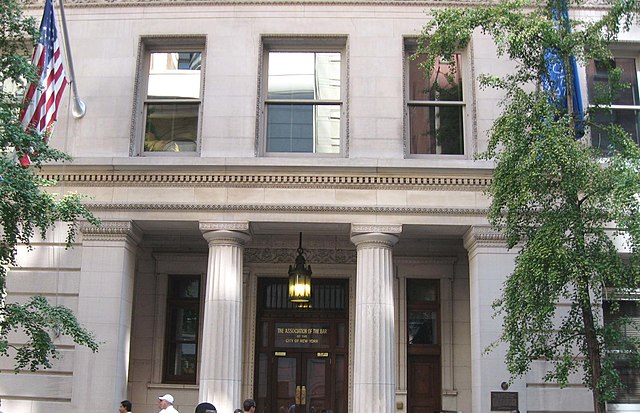
Please Follow us onGab,Minds, Telegram,Rumble, Truth Social, Gettr, Twitter
Doral, Florida - This week I renewed my membership in the bar of the State of New York. New York is the hub of contract law in the United States, an essential component for conducting business. Corporations law resides in Delaware, securities law is federal, and real estate law is local, but New York contract law prevails in business transactions. This is the case not only in the United States, but also in London, Hong Kong and the rest of the world.
Respect for the rule of law is one of the key elements that distinguish America not only from Latin America, but also from most of the rest of the world. Today, however, the rule of law, and its corollary of equal treatment thereunder for every citizen, is rapidly eroding in America, especially in the State of New York. See: https://miamiindependent.com/judge-cannon-requests-jury-instructions-in-trump-documents-case/.
Stop Trump!
In their attempt to prevent Donald Trump from campaigning for re-election to the presidency this year, Democrats have launched several baseless and trumped-up litigation cases against him, in both criminal and civil courts. In the State of New York alone: (1) a civil lawsuit was filed with respect to proceedings that may have occurred over 20 years ago in Bergdorf Goodman; (2) a criminal case was filed by the District Attorney of New York County with respect to financial reporting of a Non-Disclosure Agreement; and (3) the Attorney General of the State of New York filed a civil case with respect to the valuation of properties subjected to mortgages securing bank loans.
This last case resulted in a verdict against Trump in the amount of $454 million, although there was no proof of fraud by the borrower or harm to any lenders. As the Los Angeles Daily News summarized it, this was a civil fraud trial, without a jury, in which the judge found the defendant guilty of giving excessive valuations of his assets offered as collateral, in order to obtain better loan terms. The lenders, however, adjusted those valuations downward before making their loans, and those loans were paid back in full and on time with interest. The lenders want to do more business with the Trumpster.
In order to appeal this judgment by the trial court, Trump must post a surety bond for that amount. Finding a surety company to issue such a large bond, however, has proved difficult, and the Trump Organization has unsuccessfully contacted around 30 companies. They are put off not only by the size of the bond, but also by the reputational risk of associating with Trump. His attorneys filed a motion this week with the state court seeking to reduce or eliminate the requirement of posting such a surety bond, on the grounds of its “enormous magnitude,” which is “unprecedented for a private company.”
Constitutional Defense
One potential defense for Trump is that requiring such a large surety bond in order to appeal this judgment constitutes a violation of the Eighth Amendment of the United States Constitution. The Constitution provides that: “Excessive bail shall not be required, nor excessive fines imposed….” This bond represents a requirement of an excessive amount of bail for the alleged offense, and the imposition of an excessive fine.
The United States Supreme Court recently considered a similar case, and then-Justice Ruth Bader Ginsburg, for a unanimous court, wrote an opinion that should support Trump’s position. Her opinion in the case of Timbs v. Indiana (2019) confirms that the Eighth Amendment applies to the states as well as the federal government. The court struck down a case of excessive fines imposed by the State of Indiana on a convicted drug dealer. She wrote as follows:
“The Excessive Fines Clause traces its venerable lineage back to at least the year 1215. Magna Carta required that economic sanctions ‘be proportioned to the wrong’ and ‘not be so large as to deprive [an offender] of his livelihood.’ For good reason, the protection against excessive fines has been a constant shield through Anglo-American history. Exorbitant tolls undermine other constitutional liberties….Excessive fines can be used, for example, to retaliate against or chill the speech of political enemies.”
Trump’s lawyers should immediately file a request for a stay of the surety bond requirement with the United States District Court for the Southern District of New York. Justice Ginsburg understood how the protection from excessive fines underpins our overall constitutional liberties.
Democratic Despotism
A legal system that protects liberty under the rule of law is based upon neutral rules that are in place in advance, and are applicable to all equally, without regard to the beliefs, status, class, religion or any other such characteristic with respect to each individual. This is the aim of classical liberalism: to erect a limited system of laws applied to each of us equally as a foundation for our individual liberty. As President Lincoln expressed it, this is government of, by and for the people.
The alternative is rule by a system of laws applied at the discretion of ruling elites, who exempt themselves and their cronies from these rules, and apply them to others on an arbitrary and capricious basis. Those targeted citizens can be caught up in an intricate web of laws. This system is what Tocqueville referred to as “democratic despotism,” where democratically-elected officials engage in despotic rule over disfavored citizens.
Instead of the rule of law, in New York today we have the rule by law, conducted by the arbitrary and capricious actions of democratically elected officials - - democratic despotism.
‘NO AD’ subscription for CDM! Sign up here and support real investigative journalism and help save the republic!‘
- BREAKING: Chinese National Attempted To Retrieve Downed Drone That Flew Over Newport News Shipbuilding, Device Was Full Of 'Pictures Of The Yard'
- BYRNE: Lambert Released As No Arrest Warrant Per Law In Michigan For Misdemeanors





















